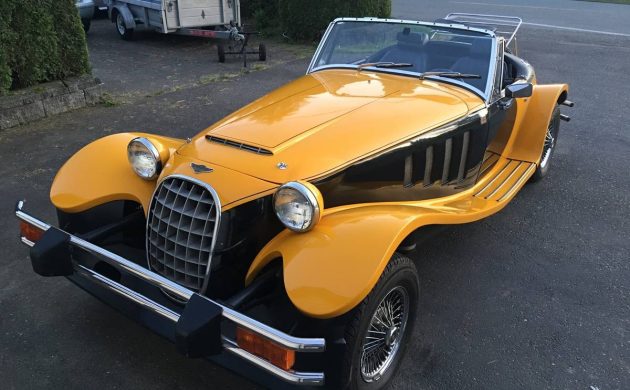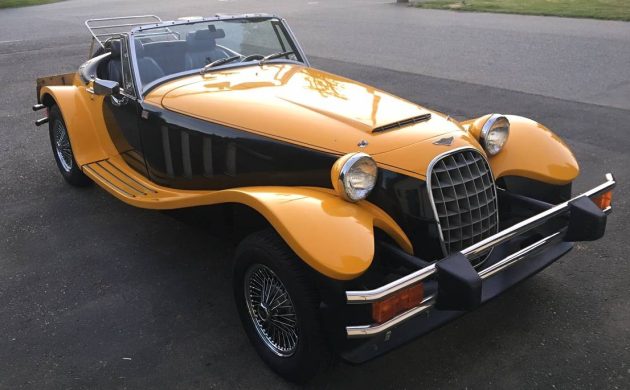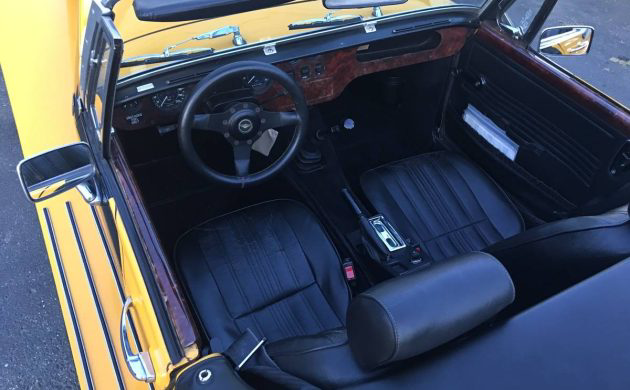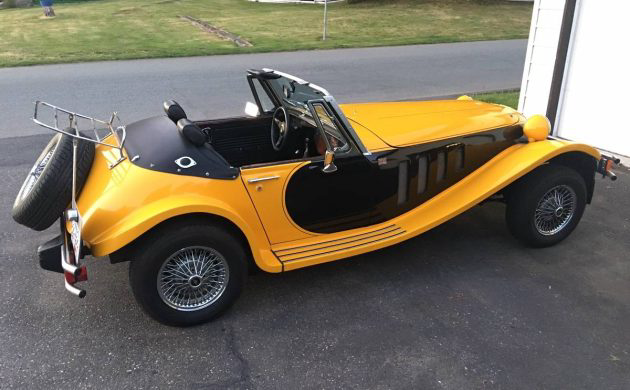Depending on who you talk to, the late Robert Jankel was considered a lateral thinker whose mind never stopped working to solve the automotive world’s many problems. In contrast, others claim his ideas were too radical and impractical to see the light of day on production cars. He formed Panther Westwinds in 1972, and one of its most successful models under his stewardship was the retro-styled Lima. Our feature car is a 1980 Lima Series 2 that is an original and unmolested survivor. Adding to its attraction, it is the extremely rare turbocharged version, providing exceptional performance for its size. The current owner feels the time is right for this classic to find a new home, listing it here on Craigslist in Langley, British Columbia, Canada. They set their price at $28,000, and I must say a big thank you to Barn Finder Rocco B. for spotting this British beauty.
It is worth examining the brief history of Panther Westwinds under Jankel’s control to understand why the company collapsed in 1980. His primary focus was on retro-style Roadsters, with models like the J72, which found homes with 368 buyers. The FF and Lazer models featured exotic underpinnings, but their sky-high prices meant only seven Lazers and a single FF rolled out of the factory. Not deterred, Panther produced the Rio. Based on the Triumph Dolomite, it was modified to resemble a miniature Rolls-Royce. Unfortunately, the sticker price was over twice that of a production Dolomite, and production ended after thirty-eight cars were built. However, his most adventurous vehicle was undoubtedly the Panther 6. Its name was derived from the fact it featured approximately 50% more wheels than the average buyer would expect to find on a two-seat sports car. It was powered by a 500ci Cadillac V8 that benefitted from a pair of turbochargers. Various development issues and the projected sticker price meant that only two of these cars ever saw the light of day. The Lima was his most successful model, and during its seven-year production run, approximately 900 were built. It is widely believed that around 300 of those were Series 2 variants, and our feature car is one of those vehicles. It presents nicely in dazzling Yellow, with the seller indicating the paint is original. It is well preserved, with only minor marks and imperfections. The fiberglass panels are excellent, which is unsurprising. Panther carefully reinforced each body to minimize flexing and deterioration. The trim and glass are in good order, and the wire wheels are virtually perfect.
It is disappointing the seller doesn’t supply engine photos because what is under the hood sets this Lima apart from mere mortals. Standard fare in 1980 was the 2.3-liter four derived from the Vauxhall Magnum. It produced 108hp and 138 ft/lbs of torque. This fed to the rear wheels via a four-speed manual transmission, making the Lima a lively performer. However, it is claimed that thirty of these classics received a turbocharged version of the same engine, pushing power and torque to 150hp and 170 ft/lbs. The transformation produced by this upgrade was significant, with the ¼-mile ET dropping from 16.7 to 15.2 seconds and the top speed climbing from 110 to 119mph. However, the seller throws us a curve ball by claiming this is the even rarer Super Sport derivative powered by a 2.6-liter turbo. I can find no mention of such a model in my reference material, but with so much of the company’s history shrouded in mystery under Jankel’s ownership, I wouldn’t rule that out. That makes the claims that this engine churns out 178hp sound plausible, while a production figure of ten cars may also be accurate. The Panther Club of England told the seller that only around three are known to exist, making this an extremely rare beast. It has clocked a mere 34,800 kilometers (21,600 miles) and appears to run and drive. The seller identifies one front brake caliper requiring a rebuild but doesn’t mention any other mechanical issues. However, it is fair to expect that a Lima in this price bracket should run and drive well.
It would be easy to dismiss the Lima as a kit car at first glance, but one look at its interior confirms this handbuilt sports car commanded a premium price when new. Extensive use of leather and genuine walnut provides a luxurious impression, although this interior lacks such touches as power windows or a radio. The overall condition is respectable, but there are some shortcomings worth considering. It appears the leather might be cracking on the driver’s seat. A specialist might be able to address this shortcoming with careful conditioning, while another specialist might be needed to tackle the visible deterioration on some timber trim pieces. The tachometer is inoperative, but everything else functions as it should.
This 1980 Panther Lima Series 2 is a fascinating car, and its combination of excellent engine power and low curb weight should make it entertaining when pointed at a strip of twisting tarmac. The seller’s price could be the sticking point for some because it is above the market average for a car that definitely isn’t perfect. However, if everything the seller claims can be verified, this is an extremely rare vehicle that might tick the boxes for a genuine enthusiast. Will it find a new home? I honestly don’t know. Only time will tell.









If that’s in the Canadian dollar, it equates to about $21K in the US. The seller said it’s mostly GM based so parts are easy to come by, but down here too? This could be a lot fun and at 28 MPG it’d be a great summertime cruiser-a good bet no one else has one in your state!
Just a suggestion though-carry a set of “Frogg Togg’s”.
I am interested. Please include photo in reply message.. ty
50% more wheels? So six altogether? Where? What am I missing.
Different car model entirely, the Panther 6, only mentioned here as part of Panther Westwinds overall history.
FWIW, the Panther 6 had 4 smaller front wheels in tandem, inspired by the Tyrrell P34 Formula 1 car, which was designed to game the F1 rules at the time by using smaller front wheels that would fit entirely behind the maximum allowed width of the front wing for better aerodynamics, but since that compromised cornering performance due to the reduced contact patch area, they simply doubled-up the front wheels to improve traction.
As such, the entire rationale for the P34’s doubled front wheels was moot in the case of the Panther 6, but they sure looked astonishing.
Cancel previous comment. I just “Googled” the Panther 6 to which you made reference and saw the 6-wheel creation. Thought this was that car. Just skimming too fast this morning.
The front end makes it seem that a Kia Amanti met up with a Morgan Plus 4 and, well, you know…
Fenders / running boards rear end sure look like a Blakley Bernardi! And I agree the front does look like the Armani
Amanti.
This is an interesting vehicle, but there are no pics under the hood or under the car. I’d like to see the engine bay.
Nice looking car. I never heard of Panther before. Thanks for the writeup.
IMO one of the more attractive neo-classical/trad-roadster-revival designs, following the general formula of a narrow torpedo body with a long dash-to-axle ratio, separate fenders, and running boards, but more tidy and modern-ish in the details than most of that ilk without trying to be too ostentatious or imitate a better-known model from a bygone era.
Yellow and black paint job is certainly eye-catching however, for a car asking $28,000 why would you not fix a caliper or a tachometer minor things like that come on.
I’m almost finished throwing up after seeing this……